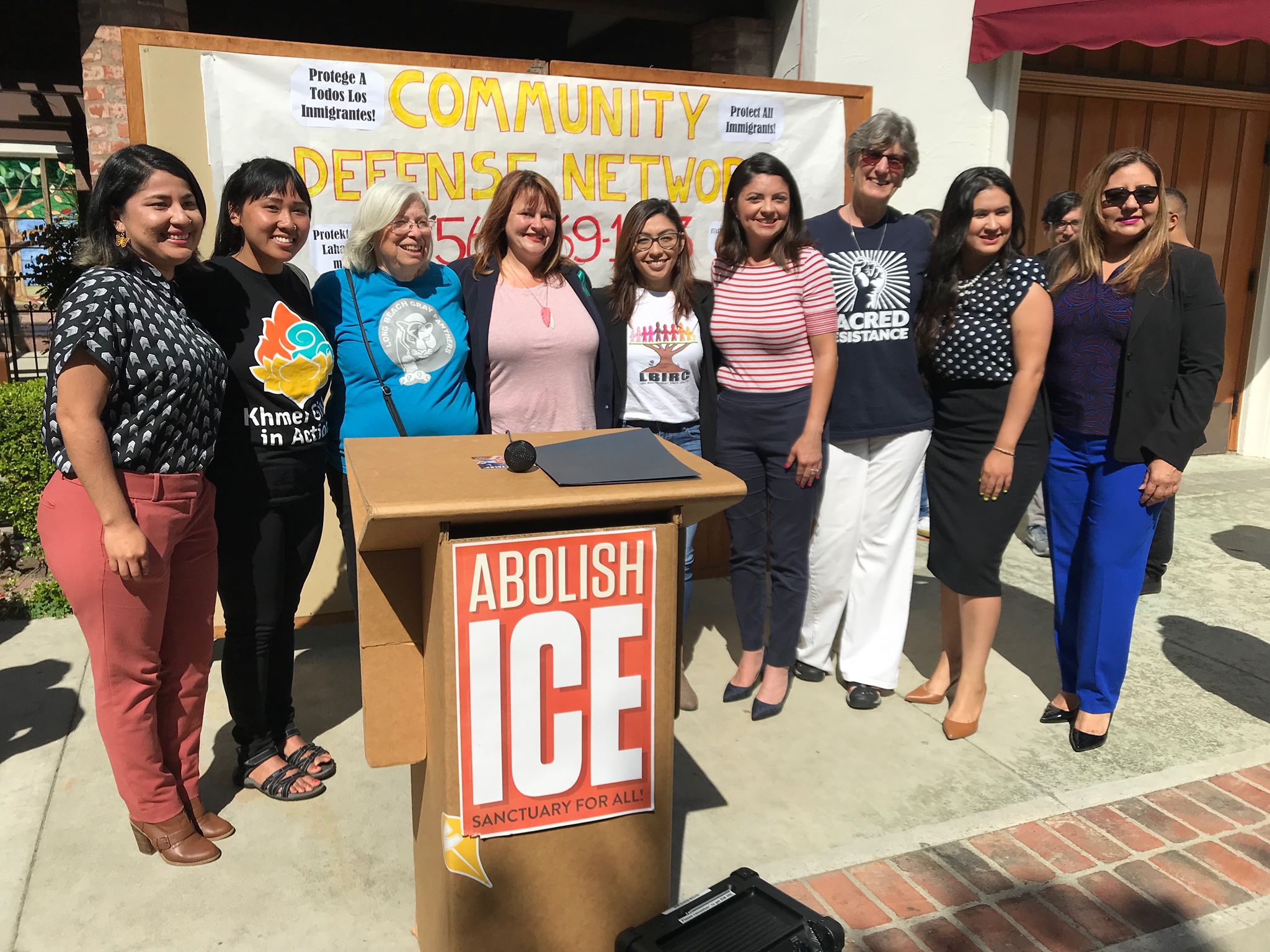Long Beach to Fight Deportations With Immigrant Legal Services Fund, Community Defense Network
The city announced the selection of its legal service provider.
8 minute readImmigrants will have access to the long-awaited Long Beach Justice Fund starting next month, a robust coalition of immigrant rights activists, the Vera Institute of Justice, attorneys, and the city of Long Beach announced at a press conference Wednesday.
“With 2.2 million non-citizen residents in the Los Angeles-Long Beach metro area that are vulnerable to deportation proceedings and four out of seven children having an immigrant parent, the need for representation in Long Beach is especially stark,” said Tania Sawczuk, a senior program associate with Vera.
The coalition announced they’ve selected Immigrant Defenders Law Center (ImmDef) as the legal service provider for the fund after a competitive proposal process. ImmDef is a Los Angeles-based social justice law firm and a leader in the growing national movement for a public defender system for immigrants facing deportation.
“The thing that’s really exciting is that we’re making a commitment and the city of Long Beach is making a commitment to due process for all,” ImmDef Executive Director Lindsay Toczylowski said. “That is really giving people the tools they need to fight back, because without a lawyer sitting up in a remote ICE (Immigration and Customs Enforcement) detention center, it’s nearly impossible to fight your case.”
She said ImmDef is excited that they won’t have to turn anyone away based on the merits of their case or whether they have a criminal record.
They also debuted the Community Defense Network, a rapid response network that mobilizes trained community members to the scene of an ICE pick-up or potential deportation in Long Beach. Once there, responders will act as observers, filming ICE agents and documenting the circumstances of the interaction. The network will also connect individuals to legal services and contact family members.
Long Beach will be joining Vera’s SAFE Cities Network (Safety and Fairness For Everyone), a group of 12 cities and counties that have committed to providing legal representation to undocumented individuals. Other California jurisdictions in the network include Sacramento, Oakland/Alameda County, and Santa Ana.
“The people of Long Beach understand that the stakes are high in immigration court and that fairness dictates that no one should have to face exile from their community, their family, their children simply because they cannot afford an attorney,” said Sawczuk, who works on the SAFE team. “One of the tenets of our nation is due process of law, and without access to legal representation, you can have no due process.”
“The Long Beach Justice Fund goes a long way to rectifying that problem,” she said.
The one-time $250,000 grant set aside by the city for the Long Beach Justice Fund is part of the People’s Budget that was lobbied for by a coalition of community groups during the city budget hearings last year. Vera added to the city’s “seed” funds with another $100,000.
The legal services fund is expected to be maintained with charitable contributions from individuals and organizations with additional grants possible from California’s Immigration Services program, according to Deputy City Manager Kevin Jackson.
In order to be eligible for the legal aid, a person must live or work in Long Beach or else have significant ties to Long Beach residents. They must also have a household income below 200 percent of the federal poverty line—about $51,000 for a family of four.
Although immigrants facing removal from the U.S. do have a right to defend themselves in court proceedings, the government is not obligated to provide them with free council. Even immigrant children are not entitled to a government-funded attorney, a federal judge ruled last year. And the consequences of deportation have in some cases proven to be deadly.
With access to an attorney, immigrants are more likely to defend themselves, to win their cases, to be released from custody, and once released, to show up to future court hearings, a 2015 study found.
Meanwhile, asylum decisions vary – sometimes drastically – from one judge to the next, including among judges who hear cases in the same court. This holds true even when cases are identical in nearly every other way. Having representation helps buffer the wildly varying biases of the judges.
Though many people placed in immigration proceedings have a valid claim to remain in the U.S., they have trouble understanding or arguing their cases alone. Even other attorneys who do not typically represent immigrants have a tough time understanding immigration law.
Tomisin Oluwole
Coquette
Acrylic on canvas
18 x 24 inches
Click here to check out our interview with Tomisin Oluwole, a a literary and visual artist based in Long Beach.

Instead of gunking up our site with ads, we use this space to display and promote the work of local artists.
Councilmembers Suzie Price (CD-3) and Stacy Mungo (CD-5) were the most vocal opponents to allowing Vera to manage the fund, ultimately voting against it along with Councilmember Daryl Supernaw (CD-4) in December. Price wanted “limitations” in place for those convicted of more serious crimes.
But the justice fund will provide universal representation.
Vera, an independent nonprofit national research and policy organization, is set to manage the fund for two years under a contract with Long Beach, providing oversight, support, and data-driven analyses of the program’s progress. After that, Vera will partner with local stakeholders and the city to find a community-based organization to take over when the contract is up.
At the press conference, Councilmember Lena Gonzalez (CD-1), who spearheaded the fund’s implementation, thanked the various immigrant rights activist groups standing behind her who worked to get both projects off the ground.
“I want to make sure that we continue pushing forward,” Gonzalez said. “As we know, our city has faced major issues in various communities, we know we have to keep pushing to ensure our immigrant families stay together.”
Although ImmDef is the acting service provider, Ana Arce with Latinos in Action California welcomed other lawyers in the area to volunteer their pro bono time to join the effort.
The Community Defense Network is also looking for volunteers, especially those who are bilingual and speak Spanish or Khmer, a language spoken in the Cambodian community.
That community has become vulnerable to deportations after ICE performed a series of raids last year. Deportations of Southeast Asian Americans have increased markedly since the start of the Trump administration, according to the Asian Law Caucus, a legal aid and civil rights organization serving low-income Asian Pacific American communities. Deportations of Cambodian-Americans increased by 279 percent between 2017 and 2018, and Vietnamese Americans saw a 68 percent increase over the same period.
When the Trump administration began threatening countries that up until recently refused to repatriate citizens with sanctions, a loss of financial support or by cutting off the visas of high-level foreign officials, Cambodia capitulated. As a result, most of those being targeted have lived in the United States for decades and were given work permits. Many have American citizen children and family members or other deep attachments to the community.
In fact, the overall proportion of cases involving immigrants who have been living in the U.S. for years has gone up significantly under the Trump administration as ICE has been redirected to focus on capturing as many undocumented immigrants as possible rather than on those who’d recently arrived or been charged with a violent offense. Prior to 2018, only six percent of new cases involved immigrants who’d lived in the U.S. for two years or more, according to the TRAC Immigration Project. That number has since risen to 43 percent.
Toczylowski warned that because the two closest immigrant detention facilities in Orange County would be closing soon, Long Beach residents detained by ICE will now often be sent to a facility just over 100 miles away.
“In Adelanto, California, in the high desert, where there is a huge for-profit prison that does ICE’s dirty work for it in holding our community there, where people are very unlikely to have representation, Long Beach will be giving them hope,” Toczylowski said. “The ripple effects of the hope that they are giving to immigrant communities will be felt across this city.”
The legal defense fund is part of a larger strategy to protect the immigrant community in the city laid out in the Long Beach Values Act of 2018, which the council passed in March.
The Community Defense Network, which is part of the Sanctuary Long Beach campaign, can be reached on their emergency line at (562) 269-1083 in the case of an ICE raid or pick-up or to notify them of impending ICE action.
FORTHE member Joe Brizzolara also contributed to this report.
Ariana Sawyer is a freelance immigration reporter based in Los Angeles, an intern with the Human Rights Watch, US-Program’s immigration team, and a graduate student of international policy and development at the Middlebury Institute of International Studies where she focuses on migration, trafficking, and human security.


 arisaw01@gmail.com
arisaw01@gmail.com




